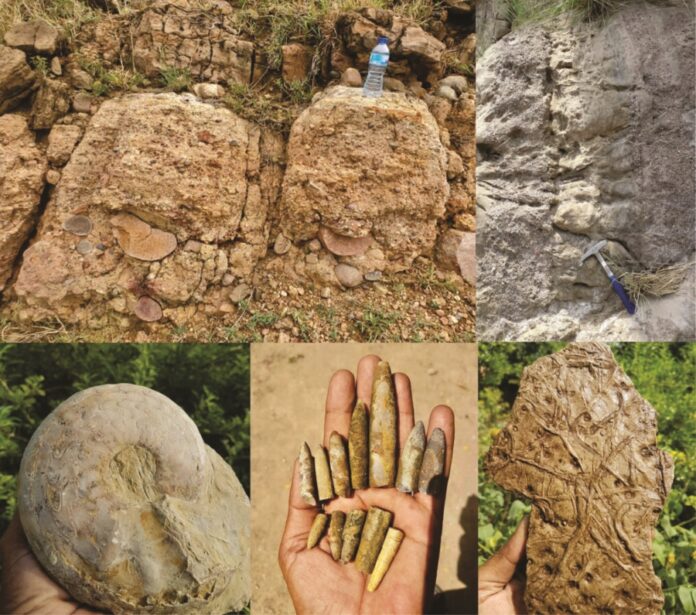A recent study by Benoit, et al. (2024) titled “Indigenous knowledge of palaeontology in Africa” published in Geological Society, London, Special Publications, shows that Indigenous knowledge of fossils in Africa spans from the 1800s to pre-colonial times, with some traditions dating back millennia.
The study delves into the rich indigenous knowledge of palaeontology in Africa, focusing on the diverse traditions, geomyths, and folklore associated with fossils found across various African cultures. This body of knowledge underscores the deep-rooted human interaction with fossils that dates back to pre-colonial times and stretches back thousands of years, illustrating a long-standing connection between humans and the natural world.
“
Indigenous African cultures have deep-rooted knowledge of fossils, emphasizing preservation for geoheritage conservation. – Benoit, et al. 2024/strong>
African cultures have historically engaged with fossils not only as natural artifacts but also as integral parts of their storytelling and myth-making traditions. These geomyths and folklore serve as cultural narratives that explain the origins, significance, and mysteries of fossils, offering insights into how ancient communities understood and related to their environments. By incorporating fossils into their myths, these cultures have created a unique tapestry of stories that reflect their cosmologies, values, and historical experiences. The article emphasizes the critical importance of documenting and preserving this fossil-related folklore as a means to promote geo-heritage conservation. By acknowledging and valuing these traditional narratives, we can foster stronger connections with local communities, ensuring that their voices and perspectives are integral to conservation efforts. This approach not only enriches our understanding of palaeontology but also empowers Indigenous communities by recognizing their historical and cultural contributions to science. Furthermore, the study advocates for future research to further explore and preserve indigenous knowledge of fossils in Africa. This involves engaging with local communities, historians, and cultural practitioners to gather oral histories and stories that have been passed down through generations. By doing so, researchers can create a comprehensive record of these traditions, ensuring that they are preserved for future generations and incorporated into broader scientific and conservation frameworks.
How the study was conducted
The authors reviewed existing literature on Indigenous knowledge of palaeontology in Africa, focusing on traditions, geomyths, and folklore related to fossils. The authors gathered evidence from various sources, including oral traditions, archaeological records, and documented folklore. The study examined several prominent fossil-bearing sites in Africa, organizing data by site and geological age. The authors compared the African record with indigenous knowledge from other continents to highlight unique aspects and challenges.
What the authors found
The authors found that indigenous knowledge of fossils in Africa spans from the 1800s to pre-colonial times, with some traditions dating back millennia. Unlike other continents, Africa has a scarce record of using fossils for traditional medicine. The study posits that documenting fossil-related folklore is crucial for preserving Geo heritage and discovering new sites. In addition, Africa holds the earliest records of fossils collected by hominins, such as the Makapansgat pebble and the Erfoud manuport.
Why is this important?
Cultural Preservation: It helps preserve indigenous knowledge and traditions related to fossils, which are an integral part of Africa’s cultural heritage.
Geoheritage Conservation: By documenting fossil-related folklore, the study promotes the conservation of geoheritage sites, ensuring they are protected for future generations.
Educational Value: The findings can be used to educate both local communities and the global audience about the historical and cultural significance of fossils in Africa.
Research Opportunities: The study opens up new avenues for research, encouraging further exploration of indigenous knowledge and its applications in palaeontology.
What the authors recommended
- The authors emphasize the need to document fossil-related folklore and traditions to preserve this knowledge for future generations.
- The authors suggest involving local communities in Geo heritage conservation efforts to foster a sense of ownership and responsibility.
- The authors encourage more research into indigenous knowledge of fossils, particularly in underexplored regions of Africa.
- The authors recommend developing educational programs that integrate Indigenous knowledge with scientific understanding to enhance public awareness and appreciation of palaeontology.
In conclusion, the study “Indigenous knowledge of palaeontology in Africa” by Benoit et al. (2024) underscores the rich and ancient connections between African cultures and fossils, highlighting the importance of preserving and documenting these traditions. By valuing Indigenous knowledge and integrating it with scientific research, we can deepen our understanding of palaeontology while promoting geoheritage conservation. This collaborative approach not only preserves cultural heritage but also empowers local communities, fostering a sense of ownership and responsibility for their natural history. As we continue to explore and document these unique traditions, we open new avenues for research and education, ensuring that the voices and wisdom of Indigenous peoples are respected and included in the global narrative of scientific discovery.
















 The African Research (AR) Index is a comprehensive scholarly directory and database focused explicitly on journal publishers that publish and disseminate African research.
The African Research (AR) Index is a comprehensive scholarly directory and database focused explicitly on journal publishers that publish and disseminate African research.

